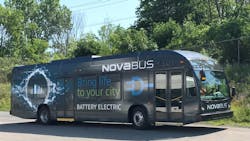New funding to move Brampton electric bus network forward
The government of Canada and the provincial government of Ontario have committed more than C$11 million (US$8.35 million) toward the Brampton portion of the Pan-Canadian Electric Bus Network.
The funding comes from two sources: C$7.6 million from Ontario's Low Carbon Economy Leadership Fund allocation and C$3.5 million from Natural Resources Canada’s (NRCan) Green Infrastructure Program. The funds will help Brampton procure, install, operate and maintain eight battery-electric buses and four 450kW overhead bus-charging stations.
The Pan-Canadian Electric Bus Demonstration and Integration Trial is led by the Canadian Urban Transit Research and Innovation Consortium (CUTRIC) and was launched at TransLink in Vancouver in April 2018 as part of a national coordinated effort to advance zero-emissions transit technology. Brampton Transit, the city of Brampton, York Region Transit and the Regional Municipality of York join Translink and the city of Vancouver as sites for the trial, with Brampton Transit having spearheaded the trial planning process back in 2016.
"This investment launches the largest interoperable system in play with the most intense use of a high-power charging system on-route in Canada. With eight e-buses and four overhead chargers in Brampton as part of the Pan-Canadian Electric Bus Demonstration and Integration Trial, today's announcement marks the moment Canada has become an unquestioned world leader in e-mobility," said Executive Director and CEO of CUTRIC Josipa Petrunic.
Brampton Transit is working with two Canadian transit vehicle manufacturers - New Flyer Industries Canada and Nova Bus - and two charging station manufacturers - ABB Group and Siemens Canada - to deploy electric buses and electric charging stations that utilize an open protocol known as the OppCharge protocol, which was first developed by Siemens and Volvo Bus Corporation.
"The Pan-Canadian Electric Bus Demonstration and Integration Trial is a unique partnership model involving multiple levels of government, bus manufacturers, system integrators and funding partners collaborating in an unprecedented way on breakthrough technology to improve the environment,” said Brampton Transit General Manager Alex Milojevic. “We are proud to be the lead transit agency in the planning and execution of this trial in partnership with CUTRIC. This project positions the city of Brampton to establish the largest single global deployment of standardized and fully interoperable battery-electric buses and high-powered overhead on-route charging systems."
The funding will help support the purchase of six New Flyers Xcelsior CHARGE battery-electric buses and two LFSe buses from Nova Bus. Additionally, the NRCan funding will help purchase four high-powered, OppCharge-compliant overhead charging systems – three from ABB and one from Siemens.
To date, the government of Canada has invested C$182.5 million (US$138.54 million) to support the deployment of electric chargers; natural gas and hydrogen refueling stations; the demonstration of new, innovative charging technologies; and the development of codes and standards for low-carbon vehicles and refueling infrastructure.
About the Author

Mischa Wanek-Libman
Group Editorial Director
Mischa Wanek-Libman is director of communications with Transdev North America. She has more than 20 years of experience working in the transportation industry covering construction projects, engineering challenges, transit and rail operations and best practices.
Wanek-Libman has held top editorial positions at freight rail and public transportation business-to-business publications including as editor-in-chief and editorial director of Mass Transit from 2018-2024. She has been recognized for editorial excellence through her individual work, as well as for collaborative content.
She is an active member of the American Public Transportation Association's Marketing and Communications Committee and served 14 years as a Board Observer on the National Railroad Construction and Maintenance Association (NRC) Board of Directors.
She is a graduate of Drake University in Des Moines, Iowa, where she earned a Bachelor of Arts degree in Journalism and Mass Communication.
